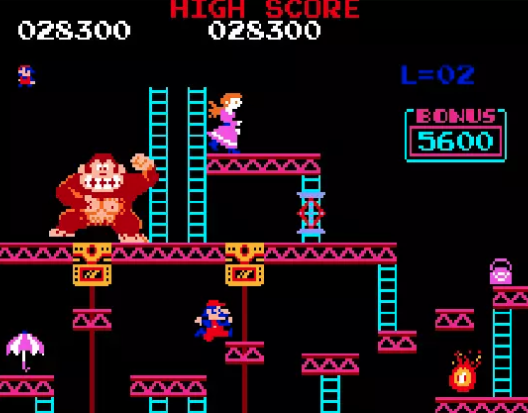
Having reviewed The King of Kong: A Fistful of Quarters recently we’re now taking a look at what’s considered one of the stupidest legal cases in history.
It’s detailed extensively in David Sheff’s excellent Game Over, but it’s worth reminding everyone of it again. As even major film studios can mess things up in the name of arrogance and greed.
Universal City Studios V Nintendo
Little known Japanese entertainment business Nintendo landed the Donkey Kong arcade game on the world in 1981.
A smash hit over in its native country, when the head honchos decided to shift it over to America there was similar acclaim and commercial adoration.
In 1982, the video game caught the attention of Sid Sheinberg (1934-2019) – the president of MCA and Universal City Studios.
Instead of viewing Donkey Kong as a daft but enjoyable slice of entertainment, he saw red. As an attorney and businessman, the burgeoning video game market was an opportunity to make more moolah.
He sent legislative expert Robert Hadl to “investigate” the game. Hadl’s conclusion was Donkey Kong ripped off the King Kong franchise.
You can see how he came to the conclusion. Here’s the trailer for the legendary 1933 version of King Kong, something of a cinematic milestone.
It’s important to note that Universal Studios felt that any “situation” analogous to the King Kong scenario was worthy of copyright infringement.
Thusly, giant ape kidnapping a human female (who would go on to become Princess Peach) was a big no-no.
Here’s the original Japanese arcade version of Donkey Kong from 1981. What do you think?
This, Sheinberg and the other c-suiters decided, was an infringement of copyright on the famous film franchise.
And in the name of big business posturing, they went all out to stamp their authority on the situation. As that’s what you do in America, yeah?
The Legal Battle
As a mammoth business running type, Sheinberg quickly set about assertively restoring order.
He demanded many of Nintendo’s liscensees (those who distributed the game across various platforms) make settlement payments or face legal devastation.
The main target in Sheinberg’s sights was Nintendo – the mysterious Japanese company that had dared to show off its landmark product in the US.
Nintendo’s attorney Howard Lincoln (who impressed enough to land himself a full-time job with Nintendo for the rest of his career) mulled over the $7 million settlement demand from Sheinberg.
Instead of capitulating, he decided to fight back. With the help of Nintendo’s US devision head Minoru Arakawa he made it clear Universal Studios had no rights over King Kong at all.
They scheduled a meeting with Sid Sheinberg to discuss the matter. There, the Universal Studios president expected the company to fold to his demands and agree on a settlement.
Instead, Lincoln told him that they had no basis to make any legal threats against Nintendo.
Sheinberg was left in shock, but then reacted angrily. As a legal battle clearly lay ahead, he confidently announced in front of everyone he viewed, “litigation as a profit centre.”
That set the scene for a classic David VS Goliath type shenanigan.
District Court
This is the stupid bit. Not that we’re suggesting Sheinberg wasn’t intelligent, but what did happen is he let overconfidence and ego get the better of him.
Whilst researching this piece we discovered he died in March this year at the age of 84. So this isn’t to disparage his obvious skills as a lawyer and businessman.
But he did get this one very badly wrong indeed.
Universal Studios sued Nintendo for the perceived infringement on King Kong. It was June 29th 1982.
Lincoln hired lawyer John Kirby for Nintendo (legend has it the company used his surname for its famous pink character).
Kirby spoke with game designer Shigeru Miyamoto and Nintendo president Hiroshi Yamauchi about Donkey Kong. The former revealed he had called the character King Kong at first, but only because this is a generic term in Japan for a giant ape.
Judge Robert W. Sweet presided over the legal battle. Whether Sheinberg expected a massive Hollywood-esque A Few Good Men deal we’re not sure.
But the case was wrapped up in a week. Kirby made it clear Universal Studios had no rights to the King Kong brand.
In fact, in 1975 they’d won a legal case where they proved King Kong and the plot was in the public domain (Universal City Studios, Inc. v. RKO General, Inc).
That allowed Universal Studios to fund a remake of the 1933 film.
Judge Sweet was pretty contemptuous about that, having a go at Universal Studios and Sid Sheinberg over wasting court time.
The judge also ruled that the Donkey Kong character is comical, so difficult to compare or confuse with the more rambunctious King Kong.
Nintendo claimed statutory damages for the bungle and this apparently amounted to around $56,000. This was a pre-international fame brand facing severe consequences had Sheinberg won the day.
Universal Studios – for whatever bizarre reason – appealed this, but that also failed in court (unsurprisingly). Nintendo then counterclaimed in 1985, which led to almost $2 million in damages from the film studio.
This is very much a lesson in not letting your ego get the better of you. But also always make sure you know what you’re going on about before spouting off.

“make sure you know what you’re going on about before spouting off”
There are many people out there right now that would do well to learn that.
Nice story, by the way! I was not aware of many of the details you mentioned.
LikeLiked by 1 person
Yeah, I met one person in particular like that this year. The term I found out today, ironically, is “sophomania”. Someone who thinks they’re more intelligent than they really are.
There are a few world leaders with that state of mind, too! The cognitive bias Dunning-Kruger effect partially explains it.
And I highly recommend David Sheff’s Game Over, if you’ve not read it. An excellent insight into Nintendo’s ascendency.
LikeLiked by 1 person
Oh, there are a lot of world leaders like that, that’s for sure!
And I will look into that book. Thanks for the recommendation!
LikeLiked by 1 person
Yeah, Game Over is entirely about Nintendo and is considered the best book about games ever. If you like Nintendo, it’s for you!
LikeLiked by 1 person
Sounds like good deal, then!
LikeLiked by 1 person
How strange that I missed that kong connection all these years.
LikeLike
There are similarities, but it clearly wasn’t about Miyamoto stealing the idea. He used various influences to structure his work.
LikeLike